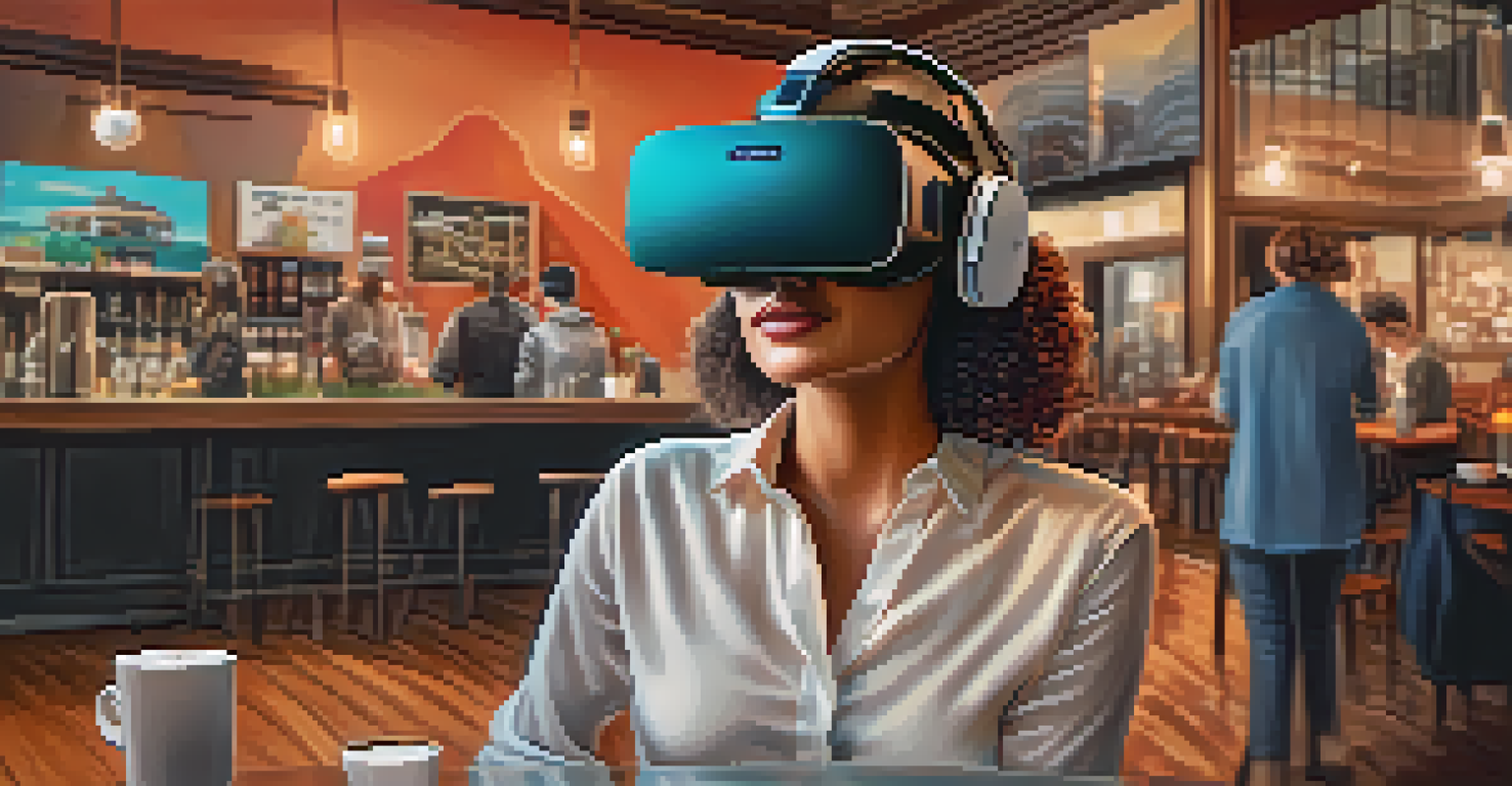Impact of Technology on Modern Rehearsal Techniques and Tools

The Evolution of Rehearsal Techniques in the Digital Age
Rehearsal techniques have come a long way since the days of pen and paper. With the advancement of technology, actors and performers now have access to a variety of tools that enhance their preparation and creative process. Digital platforms allow for instant feedback and collaboration, making it easier for teams to refine their performances before hitting the stage.
The great thing about digital tools is that they allow us to push the boundaries of our creativity and collaboration, enabling a more dynamic and interactive rehearsal process.
For example, video recording and playback allow performers to review their work, identify areas for improvement, and adjust their delivery accordingly. This immediate access to self-assessment not only boosts confidence but also encourages a more experimental approach to performance. As a result, rehearsals have become more dynamic and interactive, fostering a collaborative environment.
Overall, the integration of technology into rehearsal techniques has shifted the focus from mere memorization to a deeper understanding of character and context. This evolution not only enhances individual performances but also strengthens the overall cohesiveness of the production.
Digital Tools Enhancing Collaboration Among Performers
Collaboration is at the heart of any successful production, and technology has made it easier than ever for performers to work together. Platforms like Zoom and Google Meet have transformed how rehearsals are conducted, breaking geographical barriers and allowing for remote participation. This means that talented actors from different parts of the world can come together to create something special.

Moreover, tools like shared documents and project management apps streamline communication and organization. Cast members can leave notes, share scripts, and track revisions in real-time, ensuring everyone is on the same page. This fosters a sense of community and allows for more efficient use of rehearsal time, ultimately leading to more polished performances.
Tech Transforms Rehearsal Techniques
The integration of technology has shifted rehearsal practices from traditional methods to dynamic, interactive processes that enhance collaboration and creativity.
With these technologies at their disposal, performers can engage in more meaningful discussions and creative brainstorming sessions. This collaboration not only enhances the quality of the material but also strengthens the bonds between cast and crew, leading to a more cohesive and enjoyable rehearsal experience.
Virtual Reality: A New Frontier for Rehearsals
Virtual Reality (VR) technology is revolutionizing the rehearsal process by providing immersive experiences that were previously unimaginable. With VR, actors can step into their character's world and practice scenes in a fully realized setting, allowing them to explore their role in a new light. This technology opens up a realm of possibilities for understanding character motivations and interactions.
Technology is not just a tool; it is a facilitator of creativity that transforms the way performers connect with their craft.
For instance, a performer rehearsing a scene set in a bustling café can don a VR headset and experience the atmosphere as if they were actually there. This sensory immersion can enhance emotional connectivity and help actors deliver more authentic performances. Additionally, directors can use VR to visualize complex stage designs and staging, ensuring that every element works harmoniously together.
As more productions embrace VR technology, we can expect to see a significant shift in how rehearsals are conducted. This innovative approach not only enhances the rehearsal experience but also prepares performers for the complexities of live performances in a way that feels both engaging and realistic.
The Role of Mobile Apps in Modern Rehearsal Practices
Mobile technology has also played a crucial role in modern rehearsal practices, with numerous apps designed specifically for performers. These apps offer functionalities such as script reading, rehearsal scheduling, and even voice training, all at the fingertips of actors. This accessibility allows performers to practice and refine their skills anywhere, whether it's on a commute or during downtime between rehearsals.
For example, apps like Scriptation enable actors to annotate their scripts digitally and track changes seamlessly. This eliminates the hassle of managing paper scripts and ensures that everyone is working from the latest version. Furthermore, rehearsal scheduling apps help streamline communication about practice times, making it easier for everyone to coordinate their availability.
VR Revolutionizes Performance Prep
Virtual Reality provides immersive experiences that allow actors to explore their characters in realistic settings, enhancing emotional connectivity and authenticity.
Ultimately, these mobile applications empower performers to take charge of their rehearsal process, making it more efficient and personalized. The convenience of having rehearsal tools in one place not only enhances productivity but also fosters a greater sense of ownership over the performance.
Harnessing Social Media for Rehearsal Insights
Social media has emerged as a powerful tool for sharing rehearsal insights and connecting with audiences. Performers and production teams are using platforms like Instagram and TikTok to provide behind-the-scenes glimpses of their rehearsal processes. This not only builds anticipation for upcoming performances but also fosters a sense of community with fans and fellow artists.
Sharing short clips or updates about rehearsals can spark conversations and encourage audience engagement long before the curtain rises. This connection between performers and their audience can create a buzz around a production, making it feel more relatable and accessible. It's a modern form of storytelling that adds an extra layer of excitement to the performance.
As social media continues to evolve, its role in the rehearsal process will likely expand. By leveraging these platforms, performers can cultivate a loyal following and create a dynamic dialogue with their audience, enriching the overall theatrical experience.
Audio Technology: Enhancing Vocal Training During Rehearsals
Audio technology has significantly transformed vocal training during rehearsals, providing performers with tools to enhance their vocal skills. With the help of microphones and sound recording software, actors can receive immediate feedback on their vocal delivery and pitch. This allows them to fine-tune their performances and develop a stronger stage presence.
For example, using audio recording apps, performers can record their lines and listen back to assess their tone, clarity, and emotion. This self-reflection helps them identify strengths and areas for improvement, making rehearsals more productive. Additionally, vocal training apps can guide actors through exercises to strengthen their vocal cords and improve projection.
Mobile Apps Empower Performers
Mobile applications facilitate rehearsal management and skill development, giving performers greater control and efficiency in their preparation.
The integration of audio technology into rehearsal practices not only elevates individual performances but also contributes to the overall sound quality of the production. As performers become more aware of their vocal capabilities, they can deliver more powerful and engaging performances that resonate with audiences.
The Future of Rehearsal Techniques: A Tech-Driven Approach
Looking ahead, the future of rehearsal techniques is undoubtedly intertwined with technological advancements. As new tools and platforms emerge, we can expect to see even more innovative approaches to rehearsals that foster creativity and collaboration. From AI-driven rehearsal assistants to advanced motion capture technology, the possibilities are endless.
Moreover, as technology continues to evolve, it will likely become increasingly integrated into the fabric of the rehearsal process. Performers may find themselves using augmented reality (AR) to visualize set designs or interact with virtual characters during practice. This tech-driven approach could lead to a new era of storytelling where imagination knows no bounds.

Ultimately, embracing technology in rehearsal techniques will empower performers to push the boundaries of their craft. By harnessing these advancements, artists can create richer, more immersive experiences that resonate deeply with audiences and redefine the future of performance.